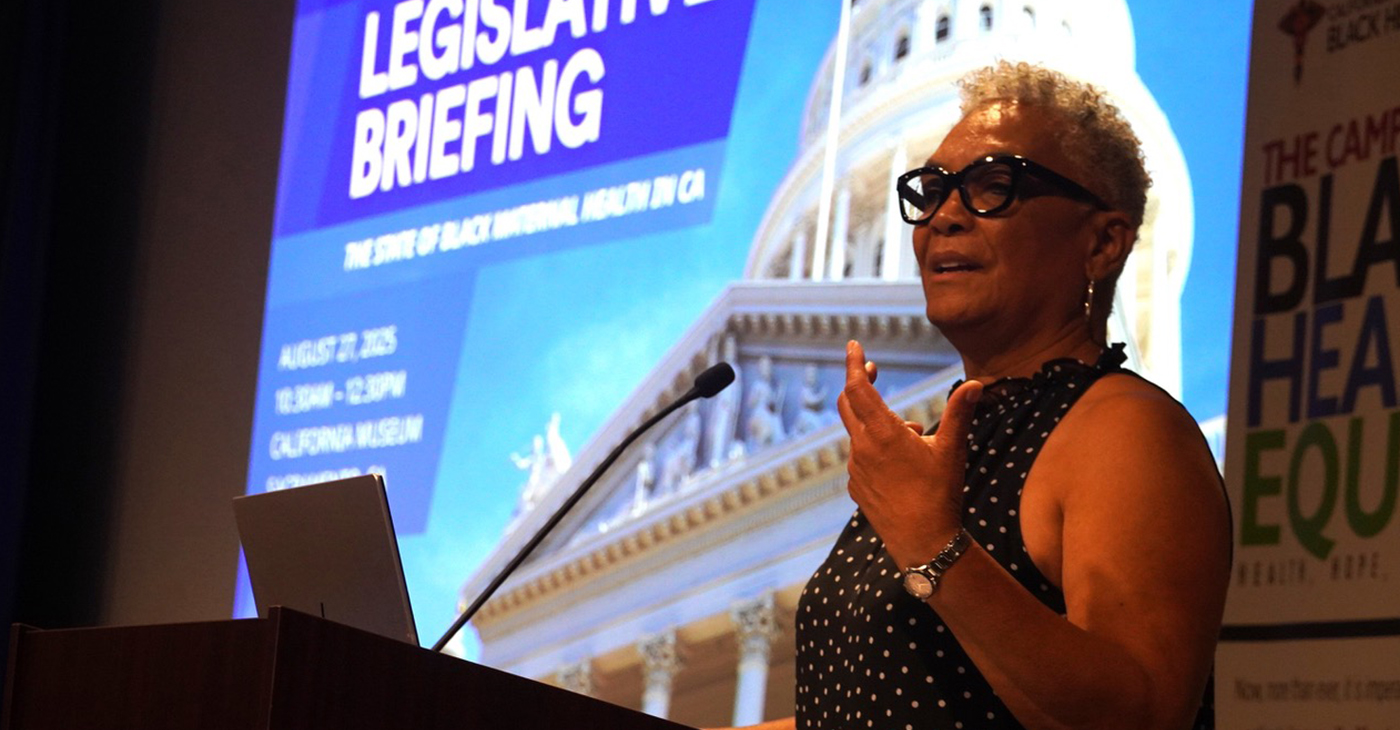Antonio Ray Harvey
Black Caucus Members Welcome New Assembly Speaker Robert Rivas
The California Assembly ushered in new leadership with the swearing in of Robert Rivas (D-Hollister) at the State Capitol in Sacramento on June 30. Rivas replaces Anthony Rendon (D-Lakewood), the outgoing Speaker who presided over the Assembly for the last seven years.

By Antonio Ray Harvey
California Black Media
The California Assembly ushered in new leadership with the swearing in of Robert Rivas (D-Hollister) at the State Capitol in Sacramento on June 30.
Rivas replaces Anthony Rendon (D-Lakewood), the outgoing Speaker who presided over the Assembly for the last seven years.
Rivas is the 71st Speaker of the state Legislature’s lower house. Known for being a pragmatic coalition builder, Rivas’ rise to power has been steady, colleagues say, since he was first elected to the State Assembly in 2018.
After being sworn in, Rivas informed the 79 other members of the Assembly that his leadership, which he says will benefit everyone, will be characterized by “urgency and unity” as his top priorities.
“California is still the greatest state in the union. But if we in this room do not act, and do not act with greater urgency, it will get more and more difficult to build a good life here,” Rivas said. “I feel, and I know that you all do, too, a great sense of responsibility because we are the ones who can keep the door open for the next generation.”
U.S. House of Representatives Speaker Emerita Nancy Pelosi (D-CA-11), U.S. Congresswoman Zoe Lofgren (D-CA-18), Gov. Gavin Newsom, and Los Angeles Mayor Karen Bass were among politicians, state officials, family members, members of the California Legislative Black Caucus (CLBC) and others present to witness 43-year-old Rivas take his oath of office.
Assemblymember Lori D. Wilson (D-Suisun City) said the day celebrates “the new season of leadership under the Honorable Robert Rivas” and all members of the Assembly’s hearts “should be filled with joy” about a man who came from humble beginnings.
“On behalf of the Black caucus, congratulations on your success,” Wilson, the chairperson of the CLBC said to Rivas. “We look forward to working with you on monumental legislation to ensure equity for all and continue dismantling systematic discrimination and racism.”
Civil rights icon and labor rights advocate Dolores Huerta, Rivas’ mother Mayra Flores, his grandmother and about 30 farmworkers from his district were “scattered throughout the chamber” to see the swearing-in ceremony along with his wife, Christen, and their daughter Melina, Rivas said.

Assemblymember Akilah Weber (D-La Mesa) thanks Assembly Speaker Robert Rivas’ wife, Christen, for being patient with him while he represents his community in the Assembly. CBM photo by Robert Maryland.
The three African American state Constitutional officers Controller Malia Cohen, State Superintendent of Public Instruction Tony Thurmond, and Secretary of State Shirley Weber also attended the proceedings on the Assembly floor.
Raised in Paicines, a small town in San Benito County with a population of under 700 people, Rivas says he watched his grandfather as a child stand side by side with César Chávez and the United Farm Workers (UFW) as a leader in the movement that won equal rights and fair contracts for farmworkers.
Rivas attended local public schools in San Juan Bautista and Hollister. During his inaugural speech, he mentioned that along with his mother and brother, he once shared a house of “three beds” with five other family members, including his cousins.
In 1988, Rivas’s grandparents, aunts and uncles pooled together money to purchase a small house for $140,000 in the city of Hollister, a community established by ranchers and farmers in 1872.
“It was a massive investment, but it was doable,” Rivas remembered his family’s ambition to own a home of their own. “It gave us a sense that our future was not so precarious and that there was a place for us in the greatest state in the country: in California.”
Rivas graduated with a bachelor’s degree in government from California State University Sacramento and later earned a master’s degree in public administration from San Jose State University.
A lifelong resident of the 29th Assembly district, Rivas served two terms on the San Benito County Board of Supervisors prior to becoming an assemblymember in 2018.
During his first term in the Fall of 2020, Rivas was appointed the Chair of the Assembly Agriculture Committee and elected as Vice-Chair of the influential Latino Legislative Caucus.
Rivas’ priorities are directed at tackling California’s housing and homelessness crisis, battling climate change, and enhancing public services and infrastructure.
“I am excited for the future of this body and even more excited for the future of this great state with Robert as our speaker,” said Assemblymember Akilah Weber (D-La Mesa), who is also a member of the CLBC. “So, congratulations to our speaker designate and my good friend Robert Rivas.”
Antonio Ray Harvey
$96 Million Allocated So Far to Black-Owned Firms as High-Speed Rail Project Expands Jobs, Boost Local Economies
Sen. Lola Smallwood-Cuevas (D-Los Angeles), a member of the California Legislative Black Caucus (CLBC) and Chair of the Senate Committee on Labor, Public Employment and Retirement, says the rail project “is exactly the kind of investment” California needs.

By Antonio Ray Harvey, California Black Media
As of May 31, the most recent data from the California High-Speed Rail Authority shows that 47 African American-owned firms are participating in the project as Disadvantaged Business Enterprises (DBEs).
A total of 936 Certified Small businesses are working on the high-speed rail program statewide, representatives of the high-speed rail project say.
The number of Black-owned DBE firms (5.2%) accounts for $96 million of the $1.136 billion allocated to minority firms thus far.
Sen. Lola Smallwood-Cuevas (D-Los Angeles), a member of the California Legislative Black Caucus (CLBC) and Chair of the Senate Committee on Labor, Public Employment and Retirement, says the rail project “is exactly the kind of investment” California needs.
Smallwood-Cuevas, speaking in Aug. 25 at the State Capitol Swing Space Annex — along with a coalition of Democratic state legislators and union leaders — provided an update on the California High-Speed Rail project and its efforts to employ people from the Black community and businesses.
“It builds a cleaner, more connected California while creating thousands of union jobs,” said Smallwood-Cuevas. “And we must ensure workforce equity, with pathways that open doors for workers who too often have been left out of good-paying careers.”
The remaining DBE minority-owned firms received the following amounts:
- Asian Subcontinent: 24 firms received approximately $65 million
- Asian-Pacific Islander: 52 firms received approximately $86 million
- Native American: 6 firms received approximately $39 million
- Hispanic/Latino: an unspecified number of DBE businesses received approximately $848 million
There are currently 328 certified DBEs participating in the project, according to the California High Speed Authority. The multi-billion-dollar project is billed to be committed to small, disabled, disadvantaged, and diverse businesses playing a major role in building the statewide high-speed rail project.
“As a Central Valley native, I know firsthand how transformative high-speed rail will be for our communities,” stated Assemblymember Lori D. Wilson (D-Suisun City) a member of the CLBC and Chair of the Assembly Transportation Committee.
“Stable and sustained funding is essential to delivering this project and fulfilling the promise made to voters.”
The news conference was hosted by Senate Transportation Chair, Sen. Dave Cortese (D-San Jose), who was promoting Senate Bill (SB) 545. He and the California High-Speed Rail Authority (CHSRA) urged the Legislature to commit to a steady, annual investment from a cap-and-trade program to fund the high-speed rail project.
Dr. Melanie Okoro, the Principal and Chief Executive Officer of Eco-Alpha, attended the briefing. Eco-Alpha is a Sacramento-headquartered small, women-owned, minority-certified firm.
The company, not classified as a DBE, earned its status as a certified small business and a certified women-minority small business through the California Public Utilities Commission (CPUC) and the Department of General Services (DGS). The certification allowed Eco-Alpha to be featured by CHSRA as a small business working on the project.
The Black-owned firm provides engineering and environmental services to the California High-Speed Rail project, primarily focused on facilities operation and Maintenance.
Okoro said laborers are not the only workers benefiting from the project. Professionals of color in engineering, with specialized knowledge and problem-solving skills to design, build, and maintain a wide array of structures, systems, and products, are looking forward to these “great opportunities.”
Activism
Sacramento: Lawmakers Hear From Health Advocates on “State of Black Maternal Health”
Participants highlighted several past and current bills going through the state Legislature that focus on improving maternal health equity. The proposals address systemic inequities to improve the healthcare experiences of Black women during pregnancy, labor, and postpartum.

By Antonio Ray Harvey, California Black Media
Adjoa Jones is a Los Angeles-based health and community leader who has dedicated her career to advocating for equitable birth outcomes for Black mothers and infants.
Participating in a legislative briefing hosted by the California Black Health Network (CBHN) on Aug. 27, Jones shared stories that shed light on the disproportionately high rate of pregnancy-related complications and deaths among Black women.
Two Black women in Southern California, Jones says, suddenly passed away after giving birth. From Jones’s perspective, those maternal mortalities could have been prevented.
“I come to you speaking from the voices of our community. From the stories of two unforgettable mothers, but it really speaks to the most preventable tragedies,” said, Jones, who is the Director of African American Infant and Maternal Mortality Prevention Initiative at the L.A. County Department.
“It’s not just impacting California, but our nation far and wide,” Jones added during the event titled “The State of Black Maternal Health” and held at the California State Museum in Sacramento.
Participants highlighted several past and current bills going through the state Legislature that focus on improving maternal health equity. The proposals address systemic inequities to improve the healthcare experiences of Black women during pregnancy, labor, and postpartum.
Panelists included Sandra Poole, Health Policy advocate for the Western Center on Law and Poverty, and Brittany Chambers, Associate Professor for the Department of Human Ecology at the University of California at Davis.
Other panelists were Palav Babaria, Deputy Director for the California Department of Health Care Services, and Zea Malawa, Director of Expecting Justice.
Rhonda Smith, the Executive Director of CBHN, served as the host and moderator of the briefing.
“There are amazing and incredible women who are doing amazing work here in the state,” Smith said of the panelists who discussed potential policy solutions and accountability.
During Jones’ presentation, she shared the tragic stories of two women. One was April Valentine, who died on Jan. 10, 2023, after giving birth at Centinela Hospital Medical Center in Inglewood.
According to reports, Valentine died from a blood clot, a pulmonary embolism, that formed in her leg and circulated to her lung. A well-known complication during pregnancy. Valentine’s family members said her condition was preventable, and they filed a wrongful-death claim.
The second woman, 32-year-old Briget Cromer, died in 2023 at California Hospital Medical Center, hours after giving birth to her fifth child. Her family believes her death was due to medical negligence.
Her family’s legal team filed a formal complaint with the U.S. Department of Health and Human Services (USDHH) alleging systemic racial bias in care.
According to the California Department of Public Health, Black women are more likely than their counterparts to die during pregnancy. They represent 5% pregnancies in the state but account for 21% of pregnancy-related deaths.
“We’re doing all that we can to ensure that pregnancy is uplifted (and) pregnancy is a place that’s where folks can enjoy the journey, Jones said.
Sen. Akilah Weber Pierson (D-San Diego), an obstetrician-gynecologist, was the keynote speaker.
“Here in California, we tragically lose another mother due to pregnancy-related complications every five days,” Weber Pierson said. “Here and nationally, Black mothers are three to four times likely to be one of those mothers lost. That’s coming from 40% of maternal deaths.”
Antonio Ray Harvey
Air Quality Board Rejects Two Rules Written to Ban Gas Water Heaters and Furnaces
The proposal would have affected 17 million residents in Southern California, requiring businesses, homeowners, and renters to convert to electric units. “We’ve gone through six months, and we’ve made a decision today,” said SCAQMD board member Carlos Rodriguez. “It’s time to move forward with what’s next on our policy agenda.”

By Antonio Ray Harvey
California Black Media
Two proposed rules to eliminate the usage of gas water heaters and furnaces by the South Coast Air Quality Management District (SCAQMD) in Southern California were rejected by the Governing Board on June 6.
Energy policy analysts say the board’s decision has broader implications for the state.
With a 7-5 vote, the board decided not to amend Rules 1111 and 1121 at the meeting held in Diamond Bar in L.A. County.
The proposal would have affected 17 million residents in Southern California, requiring businesses, homeowners, and renters to convert to electric units.
“We’ve gone through six months, and we’ve made a decision today,” said SCAQMD board member Carlos Rodriguez. “It’s time to move forward with what’s next on our policy agenda.”
The AQMD governing board is a 13-member body responsible for setting air quality policies and regulations within the South Coast Air Basin, which covers areas in four counties: Riverside County, Orange County, San Bernardino County and parts of Los Angeles County.
The board is made up of representatives from various elected offices within the region, along with members who are appointed by the Governor, Speaker of the Assembly, and Senate Rules Committee.
Holly J. Mitchell, who serves as a County Supervisor for the Second District of Los Angeles County, is a SCAQMD board member. She supported the amendments, but respected the board’s final decision, stating it was a “compromise.”
“In my policymaking experience, if you can come up with amended language that everyone finds some fault with, you’ve probably threaded the needle as best as you can,” Mitchell said before the vote. “What I am not okay with is serving on AQMD is making no decision. Why be here? We have a responsibility to do all that we can to get us on a path to cleaner air.”
The rules proposed by AQMD, Rule 1111 and Rule 1121, aim to reduce nitrogen oxide (NOx) emissions from natural gas-fired furnaces and water heaters.
Rule 1111 and Rule 1121 were designed to control air pollution, particularly emissions of nitrogen oxides (NOx).
Two days before the Governing Board’s vote, gubernatorial candidate Antonio Villaraigosa asked SCAQMD to reject the two rules.
Villaraigosa expressed his concerns during a Zoom call with the Cost of Living Council, a Southern California organization that also opposes the rules. Villaraigosa said the regulations are difficult to understand.
“Let me be clear, I’ve been a big supporter of AQMD over the decades. I have been a believer and a fighter on the issue of climate change my entire life,” Villaraigosa said. “But there is no question that what is going on now just doesn’t make sense. We are engaging in regulations that are put on the backs of working families, small businesses, and the middle class, and we don’t have the grid for all this.”
Rules 1111 and 1121 would also establish manufacturer requirements for the sale of space and water heating units that meet low-NOx and zero-NOx emission standards that change over time, according to SCAQMD.
The requirements also include a mitigation fee for NOx-emitting units, with an option to pay a higher mitigation fee if manufacturers sell more low-NOx water heating and space units.
Proponents of the proposed rules say the fees are designed to incentivize actions that reduce emissions.
-

 Activism4 weeks ago
Activism4 weeks agoDesmond Gumbs — Visionary Founder, Mentor, and Builder of Opportunity
-

 Activism4 weeks ago
Activism4 weeks agoFamilies Across the U.S. Are Facing an ‘Affordability Crisis,’ Says United Way Bay Area
-

 Alameda County4 weeks ago
Alameda County4 weeks agoOakland Council Expands Citywide Security Cameras Despite Major Opposition
-

 Alameda County4 weeks ago
Alameda County4 weeks agoBling It On: Holiday Lights Brighten Dark Nights All Around the Bay
-

 Activism4 weeks ago
Activism4 weeks agoBlack Arts Movement Business District Named New Cultural District in California
-

 Activism4 weeks ago
Activism4 weeks agoOakland Post: Week of December 17 – 23, 2025
-

 Activism4 weeks ago
Activism4 weeks agoLu Lu’s House is Not Just Toying Around with the Community
-

 Activism3 weeks ago
Activism3 weeks agoFirst 5 Alameda County Distributes Over $8 Million in First Wave of Critical Relief Funds for Historically Underpaid Caregivers

















































